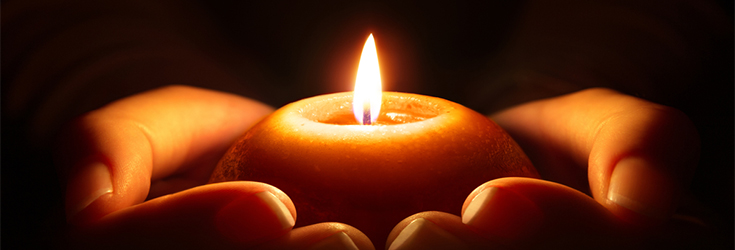The candle, a seemingly simple object, holds a profound and universal significance across various cultures and religions. Its flickering light, standing against the darkness, resonates deeply with the human soul. This article explores the symbolic importance of candles in Judaism, Christianity, Buddhism, and Hinduism, shedding light on their diverse roles in rituals, commemorations, and spiritual practices.
Judaism: Illuminating the Sabbath and Commemorating the Divine
In Judaism, the candle takes on a central role in religious ceremonies and commemorations. Every Friday night, a candle is lit to mark the beginning of the weekly Sabbath, symbolizing the divine light that shines during this sacred time. On Saturday evening, a Havdalah candle signifies the conclusion of the Sabbath, serving as a transition from the holiness of the day to the regular week.
The Chanukah ceremony further emphasizes the importance of candles in Judaism. For eight nights, a candle is lit to commemorate the miraculous burning of the temple’s candle for eight days, symbolizing the resilience of the Jewish people against adversity. Additionally, candles play a significant role in memorializing the departed. Lit in remembrance of loved ones or those who suffered in tragic events like the Holocaust, the candle serves as a beacon for the eternal flame of the divine.
Christianity: Illuminating the Divine Presence
In Christianity, candles serve both religious and aesthetic purposes. Representing the light of the Creator or specifically the light of Jesus, candles are often lit and placed on altars. In the Orthodox tradition, candles accompany rituals and are positioned in front of icons. Votive candles, lit in conjunction with prayer, symbolize a connection between the earthly and the divine.
The Paschal candle, a unique element in Christian traditions, represents Jesus and is exclusively lit on Easter and other significant occasions. This symbolizes the resurrection and triumph over darkness, aligning with the broader theme of light overcoming the shadows of despair.
Buddhism: Symbolizing Enlightenment and Reverence
In Buddhism, candles are employed as symbols of respect and enlightenment. Placed in front of statues of the Buddha, alongside offerings of food or drink, candles symbolize the light of Buddha’s teachings and the wisdom that illuminates the world. The act of lighting candles becomes a ritualistic expression of reverence and an acknowledgment of the enlightenment gained through the teachings of Buddhism.
Hinduism: Diwali and the Celebration of Light
The Hindu tradition features the diya, a clay lamp that holds a candle during religious ceremonies. Symbolizing prosperity and enlightenment, the diya plays a crucial role in Hindu rituals, casting light on the sacred space. Diwali, also known as the festival of light, is a prominent Hindu celebration where lamps are lit to symbolize the victory of good over evil, life over death, and hope over despair.
Conclusion: The Universal Flame of Symbolism
Candles, with their flickering flames, transcend cultural and religious boundaries, weaving a common thread that unites humanity. Whether illuminating the Sabbath in Judaism, symbolizing the divine in Christianity, signifying enlightenment in Buddhism, or celebrating life in Hinduism, the candle stands as a universal symbol of hope, spirituality, and the triumph of light over darkness. Its enduring flame continues to inspire and connect people across the globe, reinforcing the profound and timeless symbolism embedded within the simple act of lighting a candle.











